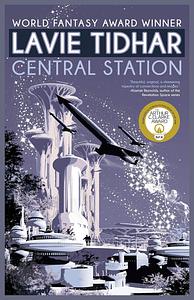Take a photo of a barcode or cover
Some interesting ideas but it was originally separate short stories which were grafted together and it shows.
I feel almost certain this is an important book. It definitely is packed full of fascinating ideas, exploring what it means to be human, and blurring the borders of "post-human" in a myriad of ways, from "joining" with the otheres to various types of cyborgisms and implants.
In the end though, I read to be entertained, and this book is far too heavy for that. The whole novel is suffused with a sort of melancholy that sinks into you as you read, and i've put this one down with a mind that is lethargic and a little sad.
Those of you who love deep themes and literary novels that delve into characterisation and the meaning of modern life will likely get a charge out of this one. It does what it does quite well, It just wasn't for me.
In the end though, I read to be entertained, and this book is far too heavy for that. The whole novel is suffused with a sort of melancholy that sinks into you as you read, and i've put this one down with a mind that is lethargic and a little sad.
Those of you who love deep themes and literary novels that delve into characterisation and the meaning of modern life will likely get a charge out of this one. It does what it does quite well, It just wasn't for me.
This book is amazing! I'm so glad that I started reading without any rush because even though I was hooked from the beginning, maybe if I had wanted to get to the end quickly I would have grown tired.
That is to say, the books has its own pace, and it is not about resolving something. Tidhar tells the story of a place and he lets you become part of the place and know its nooks. His writing style is so beautiful, and engrossing, it was a joy to read this.
It is literary sci-fi very well done, and I think it's the first of its kind that I have read. I'm not a big fan of literary fiction, but I'm glad that it didn't put me off.
That is to say, the books has its own pace, and it is not about resolving something. Tidhar tells the story of a place and he lets you become part of the place and know its nooks. His writing style is so beautiful, and engrossing, it was a joy to read this.
It is literary sci-fi very well done, and I think it's the first of its kind that I have read. I'm not a big fan of literary fiction, but I'm glad that it didn't put me off.
Central Station is a delight of imagining futuristic technology and society. This is definitely a must-read for anyone interested in science fiction. Central Station comes to us at a crucial time when we are concerned with the future and what existence will look like, as society transitions more and more towards the digital and we are constantly connected and interconnected.
I loved their conceptualization of robots and their purpose, the robotniks, the emphasis on community and family, and how one cannot escape it.
I loved their conceptualization of robots and their purpose, the robotniks, the emphasis on community and family, and how one cannot escape it.
Is this a science fiction story or is it a magic realism? It's hard to say but its a beautiful story of connections.
One day, the old stories say, a man fell down to Earth from the stars…
Central Station is, in some ways, more of an experience than a novel. It’s the rush of stepping onto a crowded street, taking in the sights and smells and sounds, aware that every person shoving passed you has their own story to tell, their own thread to follow.
Part of this is the fact that the novel is a number of short stories merged into one greater story. Another factor is the setting itself—a future close enough to touch, but different enough that stepping into the world of Central Station is like stepping into a virtual reality simulation. When you put the book down, you blink your eyes and “wake up” back to the real world.
The richness of description in the book is almost overwhelming. It perfectly captures the outskirts of a bustling city, where people do what they have to do to get by, where communities are tight-knit and everyone has a past. And overlaid on top of all of it is the Conversation, the digital noise of an entire world—worlds, even, as humanity has spread to the moon and Mars and beyond.
Machines and humans and machine-humans all exist together, but it’s a messy existence. And Lavie Tidhar plunges you right into the middle of it with details so vivid you can taste the air in Tel Aviv.
But this book is more about humans than it is about technology. Cultures blend together. Old traditions are held onto, or mutate, and new ones are created. And the people... The book really is about people. How do you survive in a world where religion is a drug? Where eye colors are trademarked? How do you make a life for yourself when the concept of life itself has changed?
The real beauty of Central Station is not in how different it is from the present, but how similar. It paints a picture of a future where we have more, but problems aren’t solved and questions aren’t answered. New technology has only given us new ways to experience the same old struggles. To me, the true message of Central Station is that humans never change, even as they become less human.
The one weakness is that Central Station tries to be too much all at once. It’s a story about humanity itself, about love, war, mortality, culture, poverty, faith, prejudice, family… It gets weighed down by its own commentary, as though checking items off a “human condition” checklist. Strangely, though, this overwhelming torrent of social discussion almost works in its favor. “Too much all at once” is a sensation the denizens of Tidhar’s future are very used to. Everything about Central Station is busy, and it's meant to be so.
I will admit, too, that while I enjoyed the read, the ending was a touch unsatisfying. Regardless, I stand by my 5-star review. Its flaws are part of what makes it perfect, and looking back, I’m not even sure if they’re flaws at all but intentional, carefully implemented imperfections.
Disclaimer: I received an advanced reader copy of Central Station by the publisher in exchange for an honest review.
Central Station is, in some ways, more of an experience than a novel. It’s the rush of stepping onto a crowded street, taking in the sights and smells and sounds, aware that every person shoving passed you has their own story to tell, their own thread to follow.
Part of this is the fact that the novel is a number of short stories merged into one greater story. Another factor is the setting itself—a future close enough to touch, but different enough that stepping into the world of Central Station is like stepping into a virtual reality simulation. When you put the book down, you blink your eyes and “wake up” back to the real world.
The richness of description in the book is almost overwhelming. It perfectly captures the outskirts of a bustling city, where people do what they have to do to get by, where communities are tight-knit and everyone has a past. And overlaid on top of all of it is the Conversation, the digital noise of an entire world—worlds, even, as humanity has spread to the moon and Mars and beyond.
Machines and humans and machine-humans all exist together, but it’s a messy existence. And Lavie Tidhar plunges you right into the middle of it with details so vivid you can taste the air in Tel Aviv.
But this book is more about humans than it is about technology. Cultures blend together. Old traditions are held onto, or mutate, and new ones are created. And the people... The book really is about people. How do you survive in a world where religion is a drug? Where eye colors are trademarked? How do you make a life for yourself when the concept of life itself has changed?
The real beauty of Central Station is not in how different it is from the present, but how similar. It paints a picture of a future where we have more, but problems aren’t solved and questions aren’t answered. New technology has only given us new ways to experience the same old struggles. To me, the true message of Central Station is that humans never change, even as they become less human.
The one weakness is that Central Station tries to be too much all at once. It’s a story about humanity itself, about love, war, mortality, culture, poverty, faith, prejudice, family… It gets weighed down by its own commentary, as though checking items off a “human condition” checklist. Strangely, though, this overwhelming torrent of social discussion almost works in its favor. “Too much all at once” is a sensation the denizens of Tidhar’s future are very used to. Everything about Central Station is busy, and it's meant to be so.
I will admit, too, that while I enjoyed the read, the ending was a touch unsatisfying. Regardless, I stand by my 5-star review. Its flaws are part of what makes it perfect, and looking back, I’m not even sure if they’re flaws at all but intentional, carefully implemented imperfections.
Disclaimer: I received an advanced reader copy of Central Station by the publisher in exchange for an honest review.
This type of novel isn't my typical choice, but I read it for a book club and enjoyed it. There's a lot going on plot- and character-wise, and many aspects of Central Station life to compare with our technology-filled existences (and our potential future?). I'm still processing, but I'd definitely recommend Central Station if you're into fantasy/sci-fi.
Central station is a very creative book. It is unlike anything else I have read and definitely builds a unique alternative future.
For me, I struggled with characters that felt a little flat (like being told they were troubled instead of seeing their trouble) and a few side narratives that felt like they started nowhere and ended in the same place.
It is still worth reading for the themes explored (AI and mortality for example), but it could have focused more building up the "why" of both the characters and the setting.
For me, I struggled with characters that felt a little flat (like being told they were troubled instead of seeing their trouble) and a few side narratives that felt like they started nowhere and ended in the same place.
It is still worth reading for the themes explored (AI and mortality for example), but it could have focused more building up the "why" of both the characters and the setting.
Exceptionally solid cyberpunkish future vignettes, all ravelled together into this interconnected story of a neighborhood and families and what it means to be human. Love this format for tying all sorts of different stories together like a loose tapestry.





